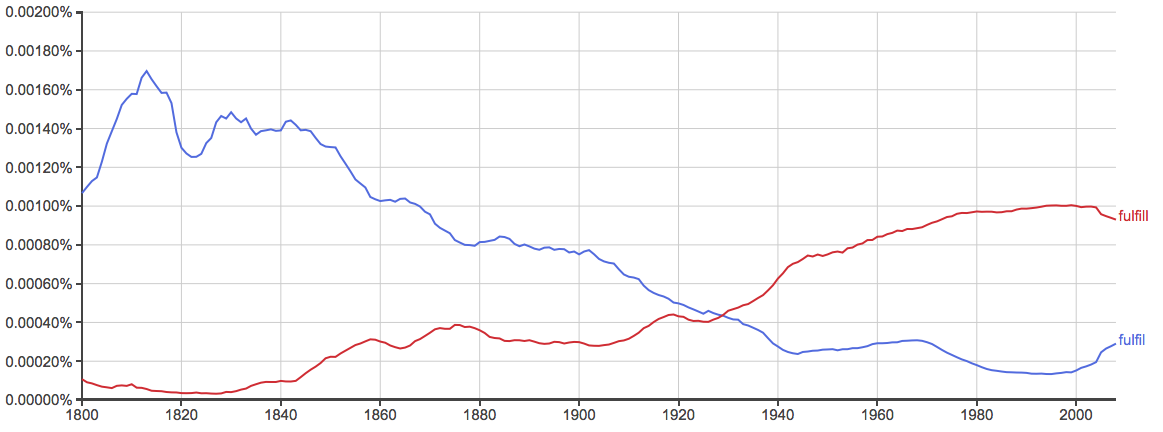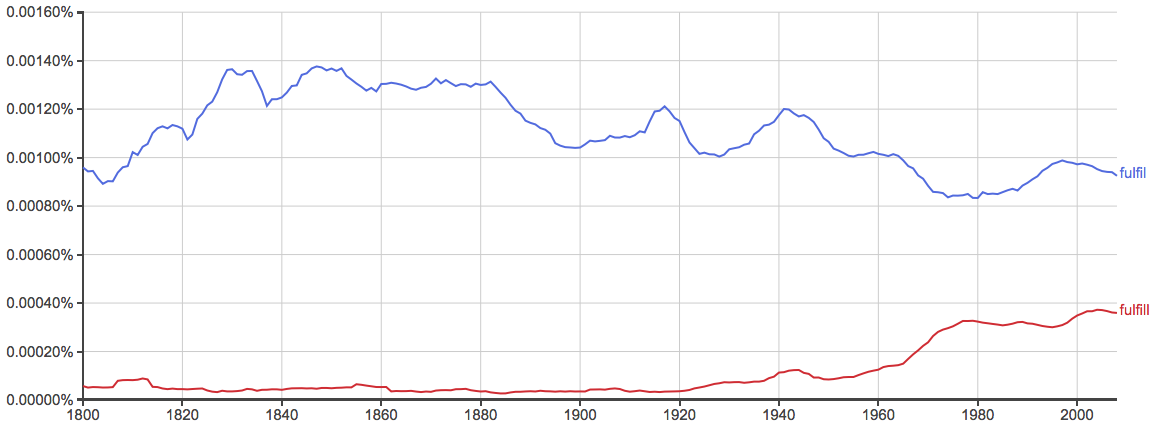Spelling differences between American and British English cause confusion for writers on both sides of the Atlantic. Why are there different ways to spell the same words at all? Why can’t everyone spell things the same way?
Having a single spelling for every word would certainly make life simpler for writers, but unfortunately, that world is not the world we live in. Words like fulfil and fulfill actually mean the same thing, but are used with different audiences.
What is the Difference Between Fulfil and Fulfill?
In this post, I will compare fulfil vs. fulfil. I will use each of these spellings an example sentences, so that you can see them in context.
Plus, I will show you a memory tool that you can use to help yourself choose fulfill or fulfil, depending on your intended audience.
When to Use Fulfill
 What does fulfill mean? Fulfill is a verb that means to achieve, carry out, or realize something. People might fulfill their dreams, or a husband might fulfill his promise to a wife.
What does fulfill mean? Fulfill is a verb that means to achieve, carry out, or realize something. People might fulfill their dreams, or a husband might fulfill his promise to a wife.
Check out the example sentences below.
- “You must fulfill your civic duty!” the mayor ordered the townspeople.
- “This vacation has fulfilled all of my wildest fantasies,” said Morgan.
- Americans want bigger, faster and more luxurious sport utility vehicles — and automakers are more than happy to fulfill the booming demand. –The New York Times
Fulfill is a regular verb, so it follows the same rules of conjugation as other regular verbs. It becomes fulfilled in the past tense and fulfilling as a present participle.
Here are a few more conjugations,
- Fulfill: First person present singular and plural, second person present singular and plural, third person present plural
- Fulfills: Third person present plural
- Fulfilled: Simple past
- Fulfilling: Present participle
Fulfill is the American English variant of this word.
When to Use Fulfil
 What does fulfil mean? Fulfil is an alternative spelling of fulfill. Where fulfill is the American English spelling, fulfil is the British English spelling. It can be used in all the same contexts and has all the same meanings for British readers.
What does fulfil mean? Fulfil is an alternative spelling of fulfill. Where fulfill is the American English spelling, fulfil is the British English spelling. It can be used in all the same contexts and has all the same meanings for British readers.
- The government is making an extra £50m in grants available to schools and nurseries as it scrambles to provide the places required to fulfil the Conservatives’ pre-election pledge of 30 hours a week of free childcare. –The Guardian
The following graphs show the relative usage of fulfill vs. fulfill in American and British English, respectively,


As you can see, fulfil has been the preferred choice in British English since before 1800. Interestingly, it was also the standard term in American English until around 1930, when fulfill became more common.
These graphs are not scientifically accurate; they only examine books published in English since 1800. They still easily illustrate a long-term usage trend between these two words
Trick to Remember the Difference
Since fulfill and fulfil are the same word, just spelled differently, one might wonder why we have to choose between them at all. Using either variant with the wrong audience would be distracting, though, and would detract from the quality of your writing as a result.
Fulfil ends with a single L, which is also how the word London begins. Since London is in England, where British English is used, the single L becomes your clue for when to use fulfil.
Summary
Is it fulfil or fulfill? Fulfil and fulfill are spelling variants of the same verb, which means to realize, achieve, or bring something to fruition.
- Fulfil is the British English variant.
- Fulfill is the American English variant.
Contents
